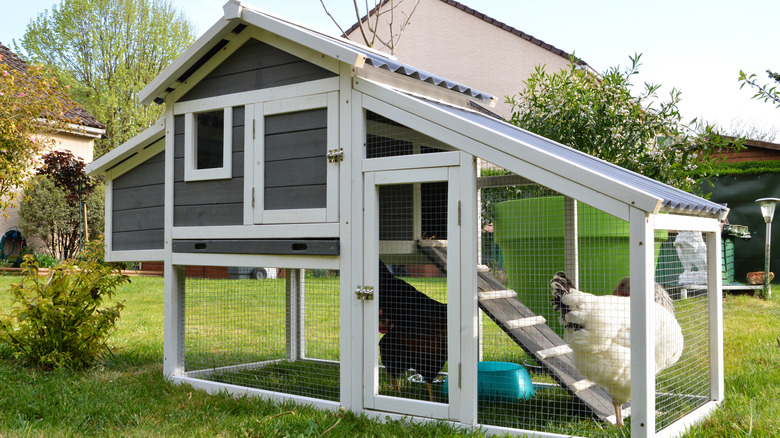Why Virginia Is Reviewing A Residential Chicken Amendment
When we think of chickens and roosters, they often evoke images of farms or the rural countryside far removed from the bustling urban sprawl of modern suburbia. People raising chickens in a densely populated city or residential area may seem like a strange concept, but it's actually not that uncommon.
Los Angeles County might be one of the last places on Earth where you would expect to find chickens inhabiting residential backyards; it's by far the most populous county in the U.S. and it's crowded and congested (via World Population Review). Yet some municipalities within Los Angeles County do permit individuals to own chickens — with certain stipulations on their proximity to the owner's residence and neighboring residences (per KCET). Chicago allows ownership of chickens and other backyard livestock, but has set strict limits about how many can be kept and where (via KTTW).
In Virginia, there are a combined 26 cities and counties that allow people to keep chickens in some form or fashion. Some set a limit on how many, while other counties don't (per Omlet). One Virginia county has become the latest to review a residential chicken amendment that would allow people living in its residential zones to own chickens (via Culpepper Star Exponent).
Another step closer to harvesting fresh eggs
Commissioners in northeast Virginia's Culpepper County are exploring the chicken proposal as another way for some people to grow their own food during a time of inflation and expensive grocery bills. Additionally, there are a number of county residents who have specifically requested the option of owning backyard chickens. One commissioner advocating for the measure noted that chickens are already permitted in Culpepper, the county seat of Culpepper County, and in neighboring counties, so it only makes sense to approve them throughout the entire county (via Culpepper Star Exponent).
Another commissioner who tallied the amendment's sole "nay" vote argued that he had heard from concerned constituents who are worried about the noise factor and roosters crowing at early morning hours and disrupting their sleep. Los Angeles County's chicken ordinance includes a stipulation that roosters must be kept 100 feet away from neighboring residences, compared to 35 feet for chickens (per KCET), for example.
The Virginia proposal would set a proximity limit of 50 feet from a neighboring property line. It would allow residents to own six chickens and produce eggs for personal consumption, but would prohibit residential sales of eggs or chickens for slaughter. The amendment passed in a 6-1 vote and is now headed to the county's planning commission for consideration.

